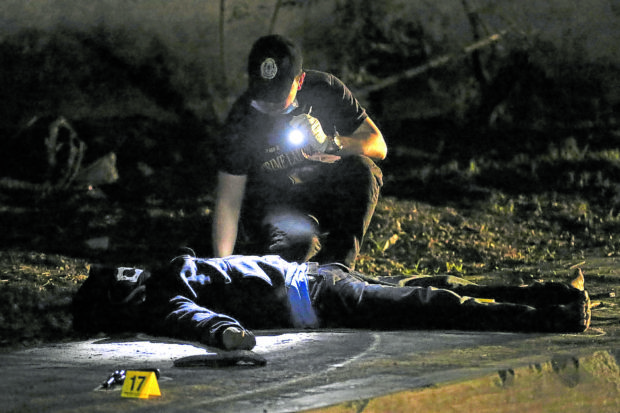No request for info from ICC yet, says Palace

A police investigator inspects the body of a suspected victim of extrajudicial killing. (File photo from the Philippine Daily Inquirer)
MANILA, Philippines — Malacañang has yet to receive a formal request from International Criminal Court (ICC) Prosecutor Karim Khan for additional information on the government’s investigation on the alleged atrocities in President Rodrigo Duterte’s bloody war on drugs, acting spokesperson Cabinet Secretary Karlo Nograles said on Wednesday.
“While we have received reports that International Criminal Court (ICC) Prosecutor Karim Khan will request the Philippines to provide substantiating information regarding its investigations into allegations involving the country’s anti-illegal drug campaign, we would like to clarify that we have yet to receive a formal request with regard to this matter,” he said in a statement.
“That being said, we reiterate our position that the ICC has no jurisdiction to probe our campaign against illegal drugs. Clearly, the ICC prosecutor’s request for information is an acknowledgment that alleged victims can seek redress in Philippine legal institutions because these are independent, impartial, and competent,” Nograles added.
After granting a request last week by Manila to defer the ICC prosecution office’s investigation of the charges against the President, Khan on Wednesday said that “in the coming days” he would ask the government for proof that it was genuinely investigating the allegations of atrocities in the drug war.
He said he wanted to be provided “promptly” with information that would substantiate the government’s claim.
Article continues after this advertisementKhan said the government’s submission must consist of “tangible evidence, of probative value and a sufficient degree of specificity, demonstrating that concrete and progressive investigative steps have been or are currently being undertaken to ascertain the responsibility of persons for alleged conduct falling within the scope of the authorized ICC investigation.”
Article continues after this advertisementHe reminded the government that while his office had temporarily suspended its own investigation of the President’s war on drugs, it “will continue its analysis of information already in its possession and any new information it may receive from third parties.”
According to Nograles, a formal request from the ICC would be a recognition that Philippine legal institutions were functioning and “independent, impartial and competent.”
“Moreover, this validates our earlier position that the ICC is the court of last resort, one that can be utilized when a State Party is unwilling to investigate and prosecute those who violate its laws; this is simply not the case in the Philippines,” Nograles added.
He also noted the efforts of various government agencies to find ways to speed up the investigations, ensure they are fair and make those responsible for extrajudicial killings and other abuses accountable.
“Our criminal justice system continues to be capable and functional, and a case in point is the signing of the Philippine National Police and the National Bureau of Investigation of an agreement to conduct cooperative investigations — evidence that a culture of impunity does not exist in our country as local institutions have demonstrated their commitment to accountability,” Nograles said.
‘Doublespeak’
Former Sen. Antonio Trillanes IV, who also filed a complaint in the ICC against Duterte, said Malacañang was engaging in “doublespeak.”
“The very reason why Malacañang officially begged the ICC to suspend its proceedings is because they have already resolved among themselves that ICC’s jurisdiction had been clearly established,” he told the Inquirer.
“Therefore, all this doublespeak about ICC’s lack of jurisdiction is merely to confuse the domestic audience, while hoping and praying that the ICC would heed its pleas,” he said.
The government has officially reported that more than 6,000 have been killed in the drug war since 2016. Human rights groups say the figure was closer to 30,000.
Human rights lawyers had urged Khan not to fall for the government’s claims that it was redressing victims’ grievances.
They said that the “domestic remedies” cited by the government were not working or stopping the killings and other atrocities.
The government withdrew from the Rome Statute, the treaty that created the ICC, in 2018 after Khan’s predecessor started an examination of the charges filed by the victims’ families.
After it declared that the ICC lost jurisdiction over the Philippines when its withdrawal from the treaty became final in March 2019, and Mr. Duterte claimed that the treaty itself was invalid because it wasn’t published in the Official Gazette, the government on Nov. 10 sought a deferral of the prosecutor’s investigation.
The request was made by Manila’s ambassador to the Netherlands, Eduardo Malaya, who informed the ICC prosecution office in The Hague that the government already was conducting its own investigations of the allegations of the victims’ families.
52 drug raids
He cited the DOJ review of 52 drug raids between 2016 and 2021 that resulted in deaths.
Malaya also cited the DOJ review of over 300 cases in the dockets of the National Prosecution Service that included ongoing and concluded preliminary investigations of deaths.
Malaya was essentially invoking Article 17 of the Rome Statute on the principle of complementarity, which means that the ICC may only exercise jurisdiction when national legal systems fail to genuinely prosecute crimes under international law.
Lawyers familiar with the ICC process say that for the country’s domestic investigations to be considered genuine, they must be investigating the same suspects for the same cases that the ICC is also investigating.
Investigators must also target persons deemed most responsible for the crimes, not just the “foot soldiers.”